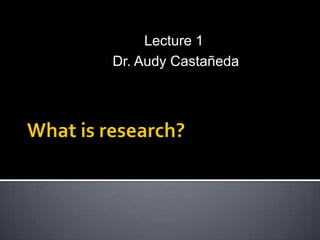
What is research presentation
- 1. Lecture 1 Dr. Audy Castañeda
- 2. research. 1.a. the systematic investigation into and study of materials, sources, etc, in order to establish facts and reach new conclusions. b. an endeavour to discover new or collate old facts etc by the scientific study of a subject or by a course of critical investigation. [Oxford Concise Dictionary] 2
- 3. Research is what we do when we have a question or a problem we want to resolve We may already think we know the answer to our question already We may think the answer is obvious, common sense even But until we have subjected our problem to rigorous scientific scrutiny, our 'knowledge' remains little more than guesswork or at best, intuition. 3
- 4. First priority is to formulate your question Then figure out how you are going to answer it How have others answered it? How does your proposal fit in with what others have done? How will you know when you have answered it? Then you can present your answer 4
- 5. Observation of some phenomenon Maybe systematic, occasional or accidental Some idea of an explanation (hypothesis) Induction, conjecture, intuition, guesswork Usually informed by related work Testing of the hypothesis Test and revision cycle 5
- 6. Probability of research Nothing is certain The exception that “proves” the rule Scientific “truth” is actually usually a statement of what is most probable given the currently known data ... ... within the given framework Statistical techniques try to help us show extent to which our results really do support the hypothesis 6
- 7. A hypothesis makes a prediction of the expected outcome in a given situation Usually: how the manipulation of the independent variable will influence the behaviour of a dependent variable The hypothesis is tested in an experiment Experimental design ensures that what you are doing is genuinely (and solely) responsible for the results Extraneous variables have to be controlled 7
- 8. If the experiment works, the hypothesis is shown to be probably correct Can’t prove 100% truth If it fails, it could be because The hypothesis is wrong The experimental design is faulty 8
- 9. Experiments are generally set up to demonstrate or support (rarely “prove” , note) a hypothesis The null hypothesis H0 is that any observed changes in behaviour are due to chance The alternate hypothesis H1 is the hypothesis you are trying to demonstrate Usually, the best you can do is refute H0 thus showing that H1 is probably correct (with a measruable degree of likelihood: statistical significance) 9
- 10. Not usually thin air From within a framework Some phenomenon is not well explained by current thinking “New” hypothesis is often just an adaptation of an existing hypothesis thesis ~ antithesis ~ synthesis 10
- 11. Thesis the original statement of an idea Antithesis an argument to challenge a previous thesis often draws on new data Synthesis a new argument from existing sources typically, resolves the apparent contradiction between a thesis and an antithesis 11
- 12. A good hypothesis is testable Not provable, in the sense of “shown to be true” (true = certain) Refutation of a thesis by proving that it is false is a cornerstone of modern science Simply refuting a hypothesis is OK but better science will explain why hypothesis is wrong, and (better still) offer an alternative hypothesis 12
- 13. By the way, have you ever wondered why we do experiments at school, the result of which is known beforehand? 13
- 14. Our experimental design may make either a strong prediction about the behaviour we expect to observe: ▪ our manipulation of the independent variable will cause a specific change in the dependent variable a prediction about a range of behaviours we expect to observe, typically perhaps two One-tailed hypothesis: statistical significance means expected result was found Two-tailed hypothesis: only need to show that the different results are statistically significant 14
- 15. The experiment measures the “behaviour” of the dependent variable DV must be operationalised Some aspect of the DV must be measurable What to measure? How to measure it? ▪ Are you really measuring what you think you are measuring? 15
- 16. Quantitative research systematically observe changes in the phenomena of interest while manipulating what are believed to be causal influences Qualitative research may be more concerned with the individual’s personal experiences of the problem under study 16
- 17. Intuitive alternative to the classical scientific method: Build something specific and then claim that it can be seen as an example of a more general class of solutions High risk difficult to demonstrate generalisability in fact doing so entails making an a posteriori hypothesis What can you say if it goes wrong ? So you still need a theoretical basis 17
- 18. Statement of the problem Literature review Choice of research method Design of study Data collection Analysis of data Write-up 18
